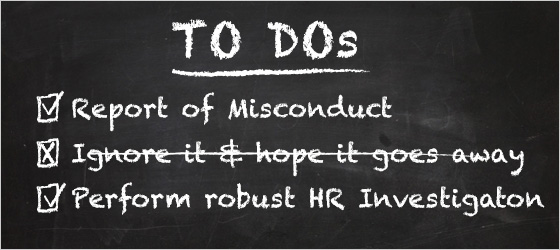In a ruling[1] that will provide guidance to many employers faced with serious misconduct, the Full Bench of the Fair Work Commission has illustrated how a reasonable workplace investigation is at the cornerstone of an employer’s defence that a dismissal complied with the Small Business Fair Dismissal Code.
Background
The employer (Steri-Flow Filtration Systems Pty Ltd) dismissed an employee in April last year following the discovery of a number of potential indiscretions including use of the employer’s property for personal gain. The dismissed employee was also the son of the original founder and managing director of the employer company Steri-Flow, who had also set up another company (SFT) in 2009 installing the son as sole director and shareholder.
Subsequently, the latter company (SFT) gained purported permission to use a product of the employer for its own purpose. Unfortunately for SFT, the managing director that granted this permission at the time of the request, had since resigned from the company Steri-Flow. The company SFT proceeded to use the employer’s product regardless.
The Investigation
Not long after taking the helm, the executive director of Steri-Flow quickly discovered the concerning dealings between Steri-Flow and the employee in question’s company (SFT).
The executive director conducted a comprehensive workplace investigation which involved extensive inquiries; including meetings and lengthy email communications with the employee, the previous managing director and another person. The extensive evidence gathered caused the executive director to conclude that the conduct that had occurred was serious enough to warrant immediate dismissal.
As a result the employee was dismissed for alleged serious misconduct (ie. breach of common law and statutory duties as an employee).
The Litigation
The employee brought an unfair dismissal claim which the employer defended. In its defence, the employer argued that it had complied with the Fair Work Act’s Small Business Fair Dismissal Code (the Code).
The Code provides that it “is fair for an employer to dismiss an employee without notice or warning when the employer believes on reasonable grounds that the employee’s conduct is sufficiently serious to justify immediate dismissal.”
If the dismissal by Steri-Flow (a small business employer) was carried out in accordance with the Code, it will be deemed to have been fair and thus the litigation would be at an end.
The Decision
At the first hearing of the matter, the FWC held that the employer did not carry out a reasonable investigation and thus the dismissal was not in compliance with the Code. The outcome? The dismissal was held to have been unfair.
The employer then appealed to the Full Bench of the FWC. This time it was successful. In finding for the employer, the Full Bench considered:
- the employer’s belief that the employee’s conduct was sufficiently serious to justify immediate dismissal AND the grounds for that belief were reasonable
- the employer’s belief was directly supported by or reasonably inferential from the reasonable workplace investigation the employer had conducted
The appeal outcome? The employer’s actions were found to be in compliance with the Small Business Fair Dismissal Code, so the dismissal was fair.
The Lesson
Employees who are dismissed for misconduct often dispute the fairness of their dismissal. Dismissals by small business employers that comply with the Small Business Fair Dismissal Code will be deemed to be fair.
It is essential that employers conduct a comprehensive workplace investigation into any report of employee misconduct, so that (1) a sound decision can be made as to whether the report is substantiated, and (2) the employer can justify its actions in the event of an unfair dismissal claim.
In the case of a dismissal by a small business employer for alleged serious conduct, the FWC will look at whether:
- at the time of dismissal, the employer held a belief that the employee’s conduct was sufficiently serious to justify immediate dismissal; and
- that belief was based on reasonable grounds – including whether the employer has carried out a reasonable workplace investigation
It would be difficult for an employer to demonstrate it reasonably believed serious misconduct had been committed without first having conducted a sound workplace investigation.
[1] Steri-Flow Filtration Systems (Aust) Pty Ltd v Erskine [2013] FWCFB 1943 (24 April 2013)


